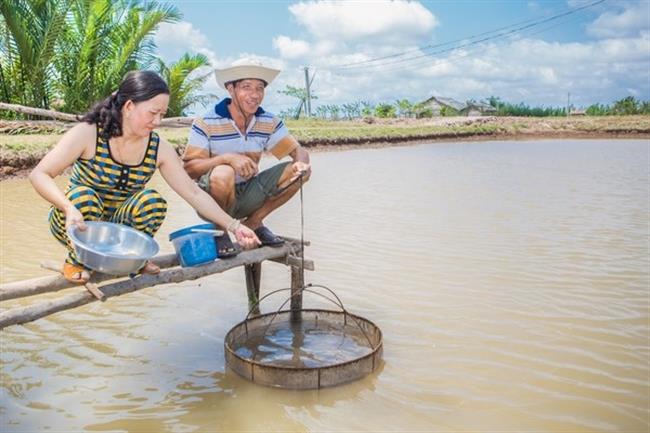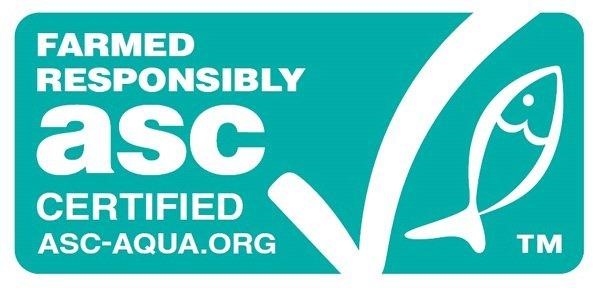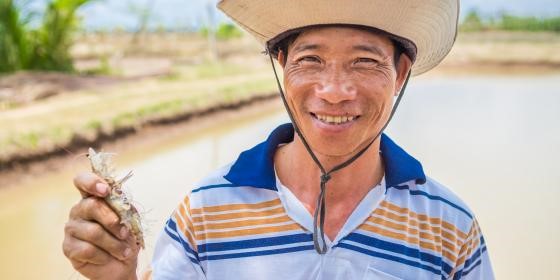What Does ‘Responsible’ Food Mean?
As a conscious consumer, you try to buy food that is produced in a responsible way, for people and planet. For many people this means buying certified products: those that contain a label telling you the product is for example organic, sustainable or fair trade. But what does this label tell you exactly? What are the effects of certification?

Nguyen Van Bap (husband) and Trinh Thi Phuong (wife) at their shrimp farm, in Vietnam. Photo Credit: Oxfam Vietnam.
To answer those questions, we must first dive into the complex world of certification. Certification is a method to ensure that the food we consume is produced responsibly or sustainably (depending on the claim). The meaning of terms like ‘responsible’ and ‘sustainable’ is defined in a standard: a list of criteria. Producers have to comply with this standard to receive certification. To check compliance, usually an auditor is hired. This is called ‘third-party certification’ and is deemed the most credible, as the auditor is independent from both the standard owner (e.g. Fair Trade, ASC, MSC) and the farmer. To make sure that the food produced at the certified farm ends up in the supermarket with a label, the product needs to be traceable throughout the supply chain. Somehow, that shrimp farmed on a certified farm in Vietnam should be traced by the local traders, processing factory, exporter and importer to end up in the supermarket. There are different methods to do this, depending on the kind of product.
So, what does the label in the supermarket tell you? It depends on the label. Let’s take the Aquaculture Stewardship Council (ASC) as an example. The ASC label can be found on farmed seafood. ASC includes both environmental and social criteria in its standard. The social criteria mainly relate to the labour hired by fish farmers, and to the impact of a seafood farm on the community in which it is situated. Oxfam Novib has been actively involved with ASC to make sure these social criteria were included.

The ASC-label
But, this is not where the story ends. There are several problems with certifications like ASC. ASC is only applicable to the farm itself, so it does not ensure the rights of workers in the processing industry, for example. Often, farmers have to pay to be audited. This means that smallholders are effectively excluded. Moreover, the standard is very complex and difficult to implement. The ASC shrimp standard is 144 pages long! After all this effort to get certified, you would expect that farmers will benefit from certification. But usually farmers do not receive a higher price for their products. That means that certification becomes a burden demanded by Northern markets, rather than a reward. Finally, there are several issues with the way the certification is organized and implemented. Audits can for example overlook important issues such as conflicts because they are carried out only once a year.

Nguyen Van Bap, shrimp farmer in Vietnam. Photo Credit: Oxfam Vietnam.
Oxfam Novib advocates towards ASC to deal with these issues. We are working with processors in Vietnam which guarantee a higher price for ASC-certified smallholders. We are working with ASC to develop group certification, which enables farmers to cooperate to get certified. And we are ensuring that women also benefit by ensuring that gender is included in impact assessments. Personally, I am documenting all the changes we want to see in ASC. So that farmers can start benefiting from producing sustainably. So that the burden is not only carried by farmers, but also by other parts of the supply chain, such as supermarkets. So that the term ‘responsible’ becomes truly meaningful.
This article was written by Sake Kruk. Sake is intern at the Food, Land and Water unit, in the ALIVE team (Access to Land, Inclusive Value Chains, and Empowerment). He works on promoting inclusive value chains in seafood and building capacity for private sector influencing strategies. Contact Sake on LinkedIn!




